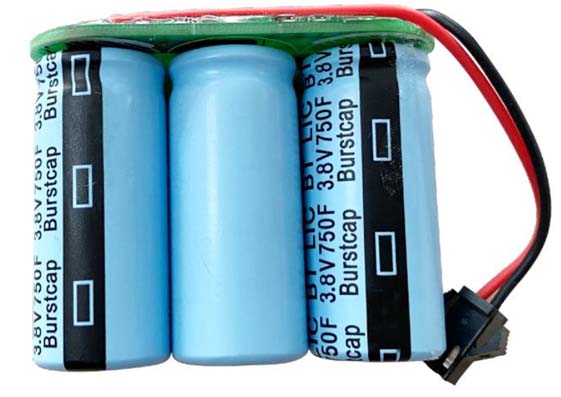Consulting phone:
135-3037-2041
(Mr.Wang)
Product introduction:
Graphene supercapacitor is a special kind of capacitor, which has extremely high conductivity and large surface area, and has higher advantages than similar products in the process of energy storage and release.
Graphene supercapacitor is a general term for supercapacitors based on graphene materials. Due to its unique two-dimensional structure and excellent inherent physical properties, such as abnormally high conductivity and large surface area, graphene based materials have great potential for applications in supercapacitors. Compared with traditional electrode materials, graphene based materials show some novel characteristics and mechanisms in the process of energy storage and release.
The main parameters
serial number | characteristic | Numerical value |
1 | Application scenarios | Power industry DTU |
2 | Rated voltage (V) | 14.4 |
3 | Capacity (F) | 187.5 |
4 | voltage range | 10V~16.8V |
5 | Nominal current | 3A-6A |
6 | energy | 4.3wh |
7 | Operating temperature range | -40 ℃ ~85 ℃ |
8 | Protection board | 4S |
9 | Charging unit protection | 4.25V |
10 | Charge and discharge unit protection | 2.5V |
11 | Overcurrent Protection | 10A |
12 | Balance current | 80mA |
13 | Equalization voltage | 4.18V |
14 | volume | 80mm*45mm*23mm |
15 | Weight (G) | 100 |

Purpose/Application:
As one of the core technologies of the Internet of Things, the selection and use of power supplies are key issues related to the trustworthiness and value of products. Although there are many existing power sources, subject to various emergencies, the power compensation and management of smart devices is particularly important. With the help of lithium-ion capacitors or ultra-fast rechargeable batteries, fast response, long life, high safety, etc. characteristic.

Precautions:
1. Use
1. The operating temperature of lithium-ion capacitors should not exceed the upper or lower limit of the rated temperature (-20 degrees to +55 degrees)
2. Lithium-ion capacitors should be used at nominal voltage. At the same time, in order to prolong the service life of the product, it is recommended that the monomer be used within the range of "rated voltage" (2.5v-3.8v).
3. Please confirm the polarity of lithium-ion capacitors before use, and avoid reverse connection.
4. The external ambient temperature has a heavy impact on the life of lithium-ion capacitors, please keep away from heat sources.
5. Do not directly touch water, oil, acid or alkali for lithium ion capacitors.
6. Do not knead, nail, or disassemble Li-ion capacitors.
7. Do not discard lithium-ion capacitors at will. When discarding, please dispose of them in accordance with national environmental protection standards.
2. Storage
1. During the transportation of lithium-ion capacitors, avoid violent vibration, kneading, rain and chemical corrosion, and handle with care.
2. Lithium-ion capacitors should not be placed in places with a relative humidity of more than 85% or containing toxic gases. In such an environment, the leads and casings are susceptible to moisture and corrosion, resulting in an open circuit of the ultra-fast rechargeable battery.
3. If the lithium-ion capacitor needs to be stored for a long time, please store it in a place with a temperature of -40~35 degrees, a relative humidity below 50%, and good ventilation.